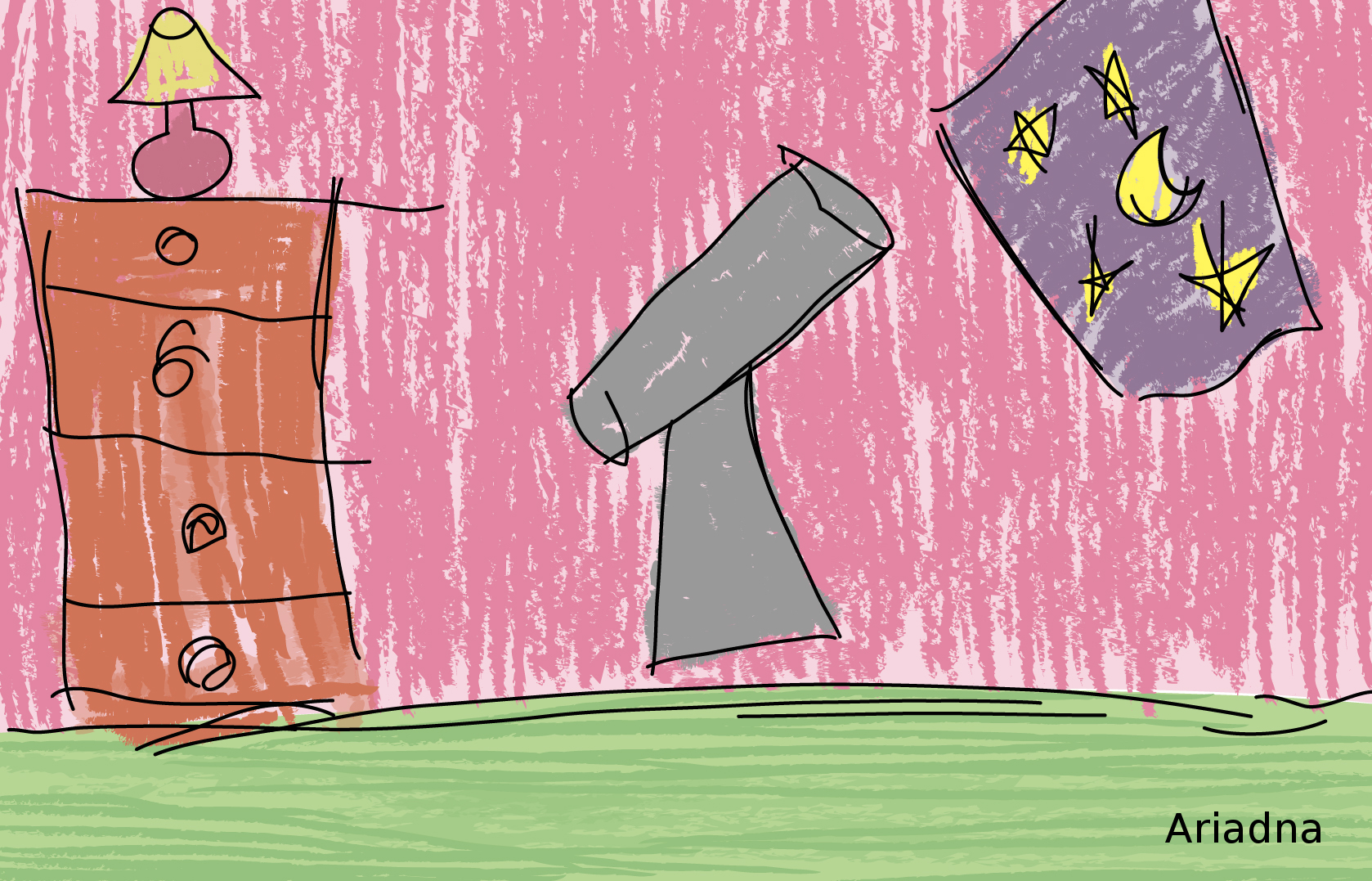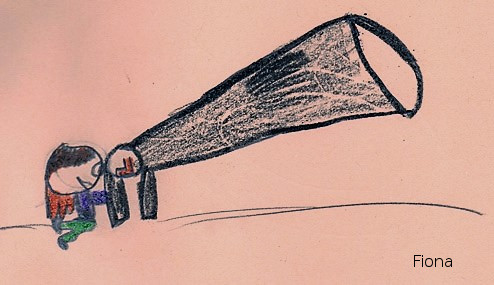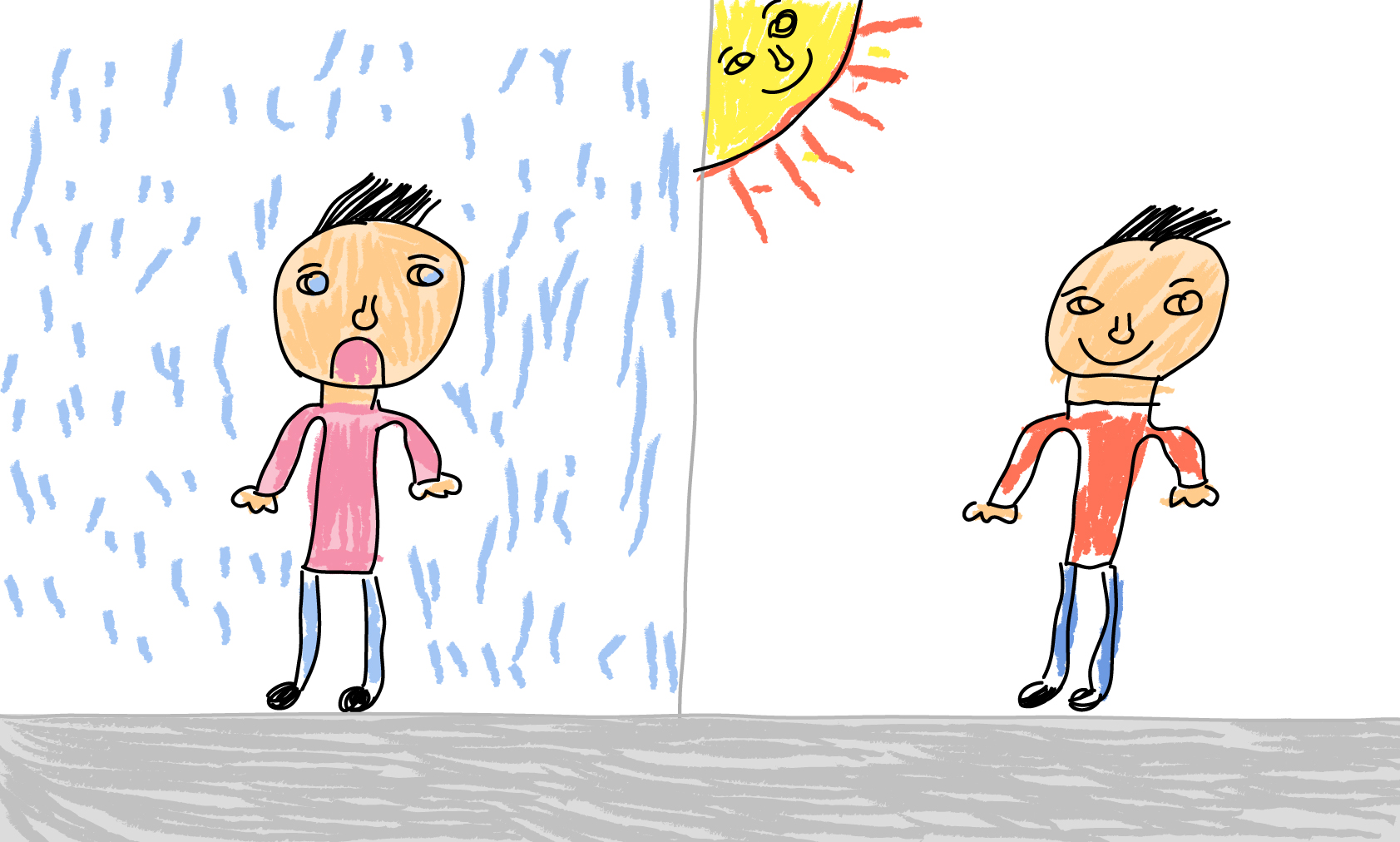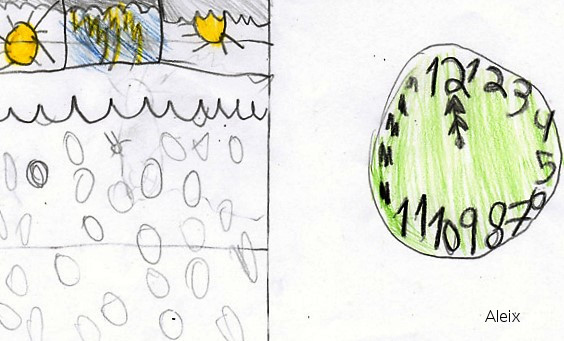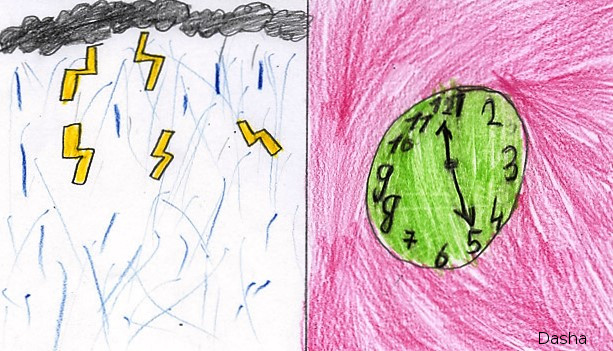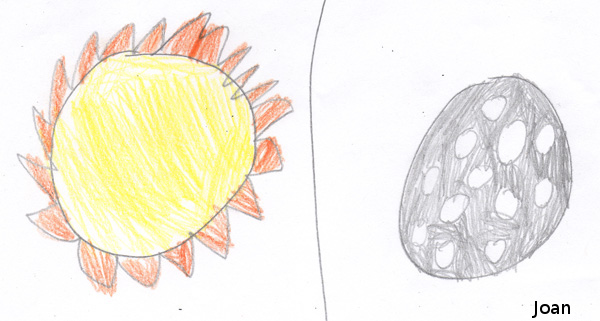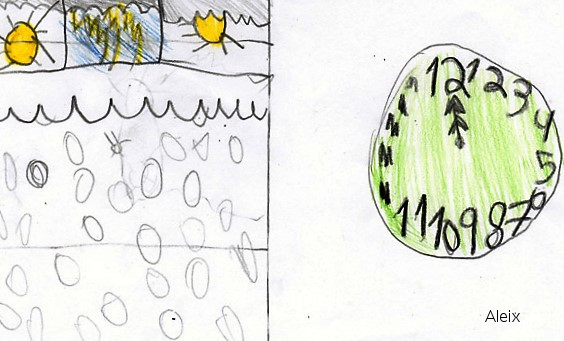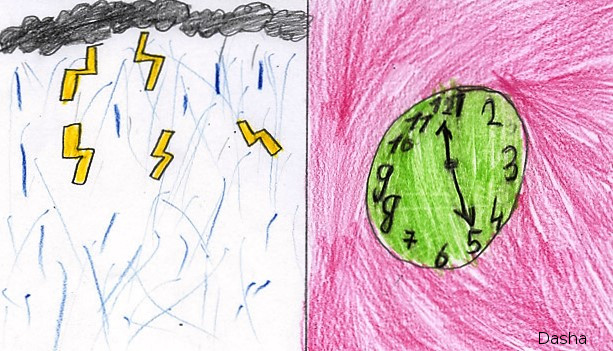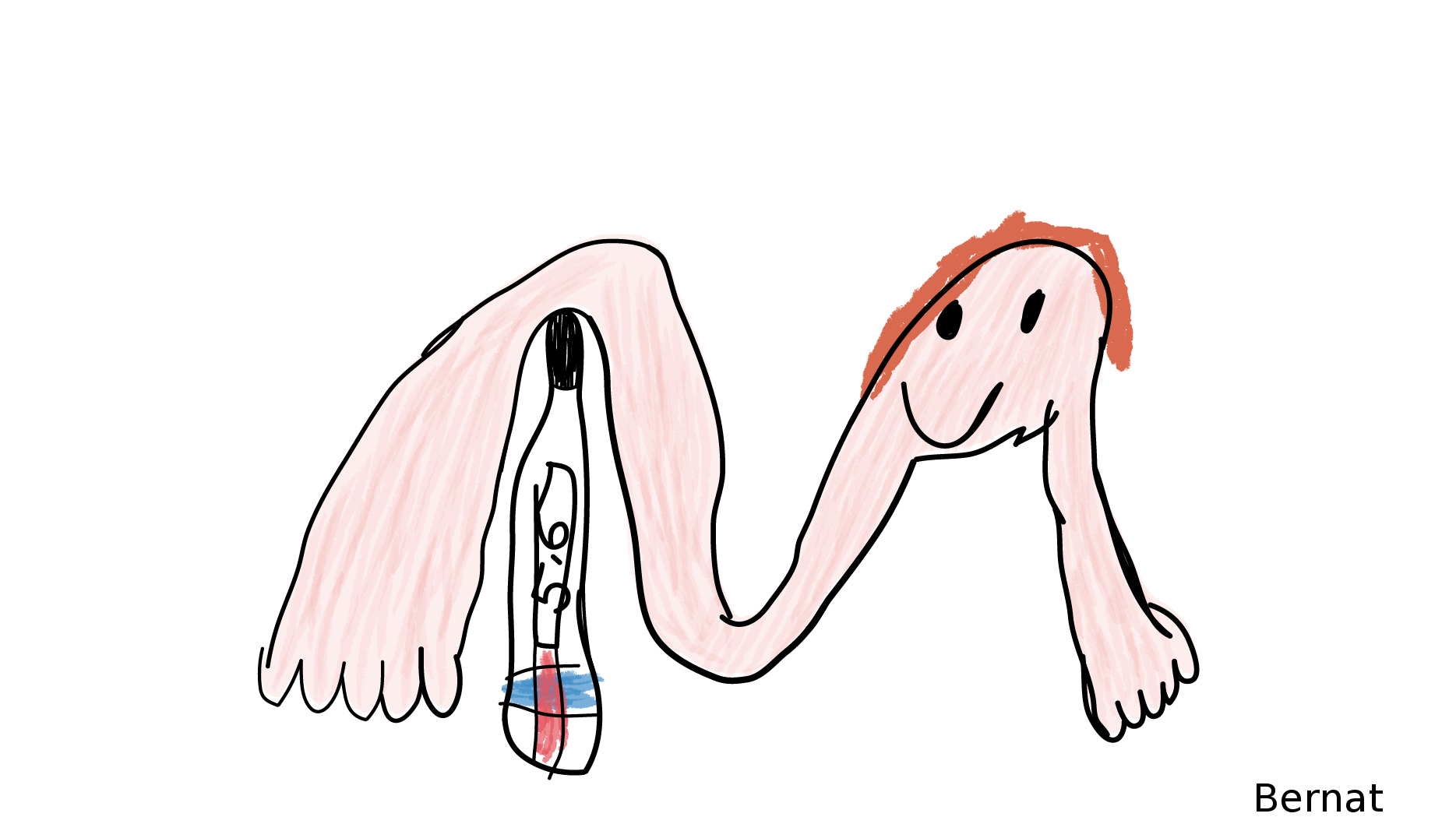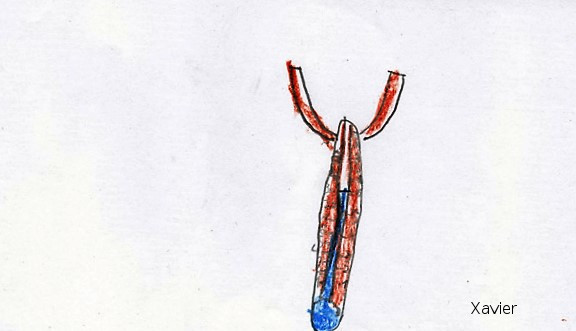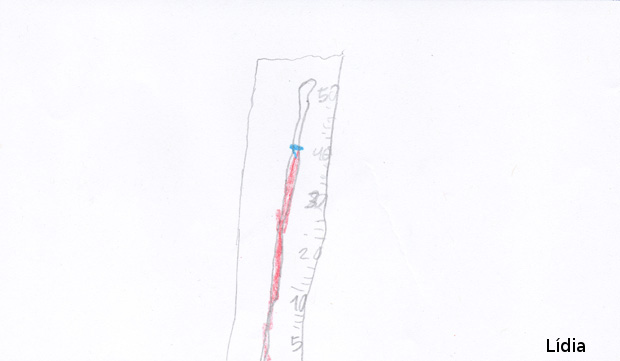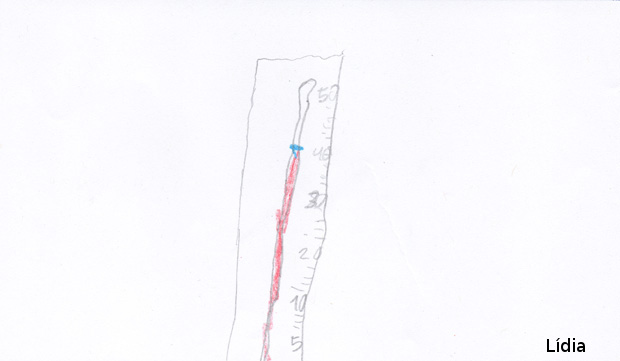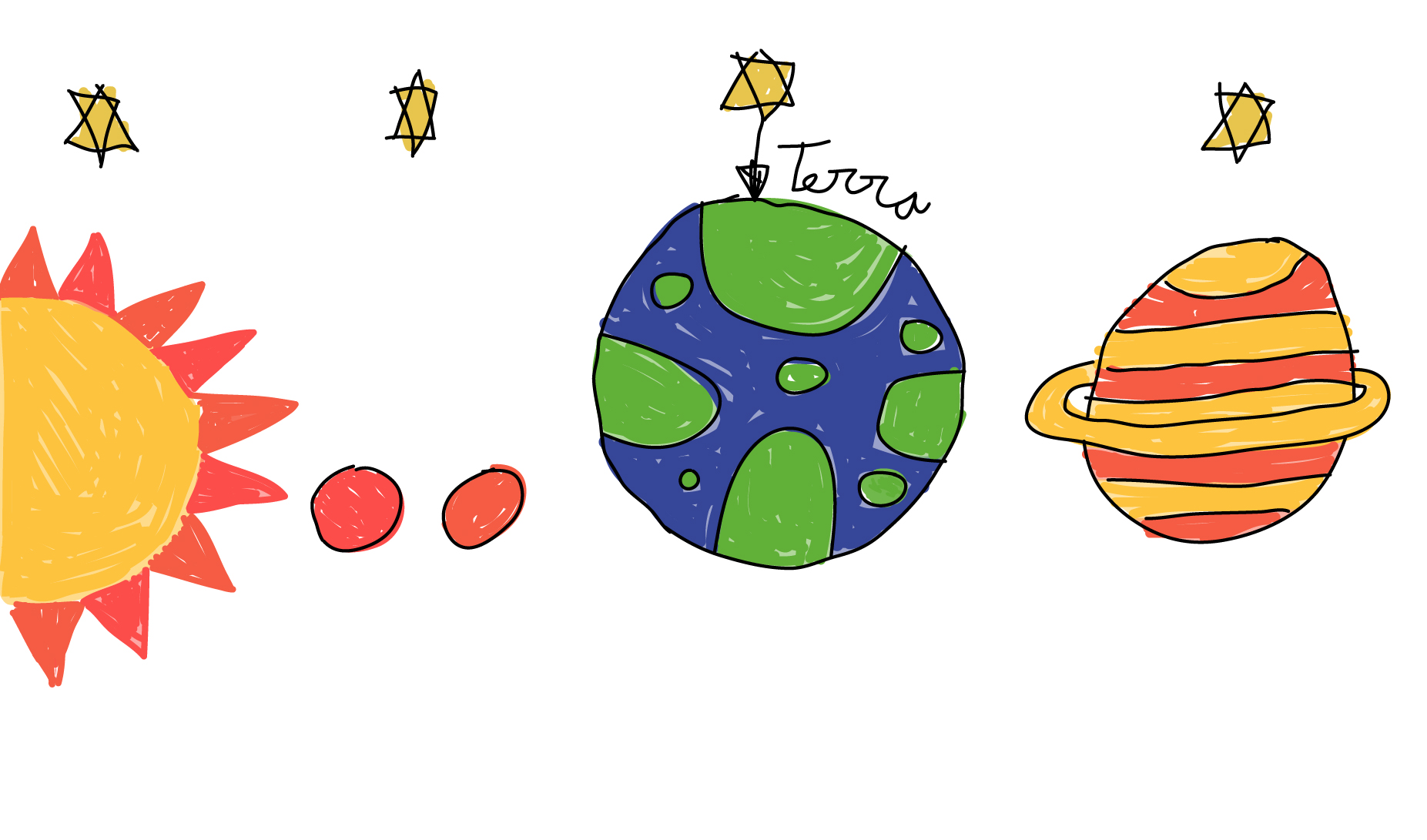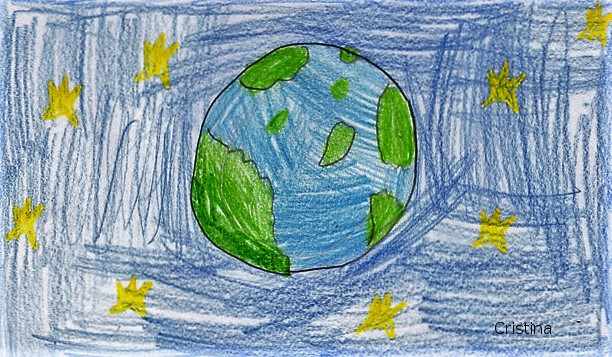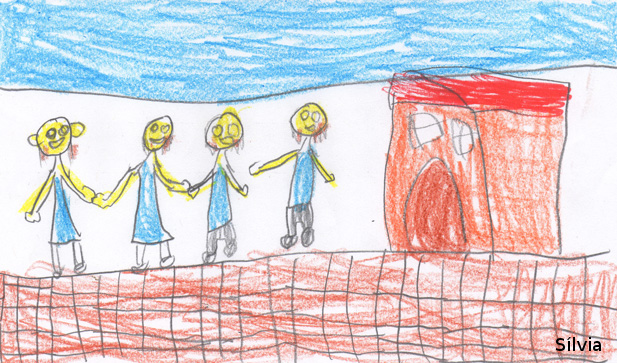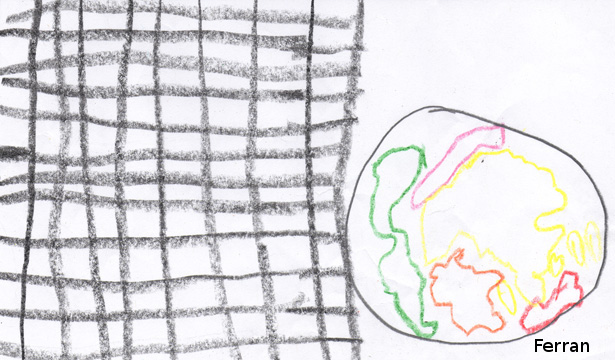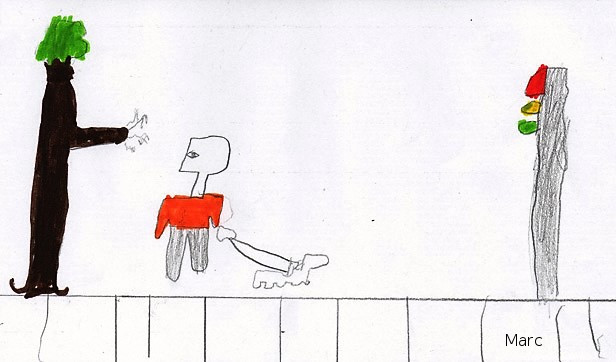telescopi
telescopi
- ca telescopi, n m
- es telescopio, n m
- en telescope, n
Definició
Un telescopi és un aparell que enfoca el que està molt lluny per veure-ho millor, com ara la Lluna, les estrelles, les constel·lacions i els planetes. En astronomia s'utilitza el telescopi per observar i investigar l'univers.
Un telescopio es un aparato que enfoca lo que está muy lejos para verlo mejor, como la Luna, las estrellas, las constelaciones y los planetas. En Astronomía se utiliza el telescopio para observar e investigar el universo.
A telescope is an apparatus that can focus in on things that are very far away, so that you can see them better, such as the Moon, the stars, the constellations and planets. In astronomy it is used to observe and investigate the universe.
temps
temps
- ca temps, n m
- es tiempo, n m
- en weather, n
Definició
El temps és com està el cel i la temperatura que hi fa en un lloc. Per exemple, si fa bon o mal temps, si fa sol o núvol, si plou o neva, si fa fred o calor, si hi ha una tempesta, etc. Hi ha persones que es dediquen a estudiar i preveure el temps que farà al cap d'uns dies i en altres ciutats o països. Quan hem de viatjar a algun lloc, podem mirar quin temps hi farà durant els dies que marxarem.
El tiempo es cómo está el cielo y la temperatura que hace en un lugar. Por ejemplo: si hace buen o mal tiempo, si hace sol o hay nubes, si llueve o nieva, si hace frío o calor, si hay una tormenta, etc. Hay personas que se dedican a estudiar y prever el tiempo que hará al cabo de unos días y en otras ciudades o países. Cuando tenemos que viajar a algún sitio, podemos mirar qué tiempo hará durante los días que estaremos fuera.
Weather is how the sky is and the temperature there is in a certain place. For example, if it is good weather or bad weather, if it is sunny or cloudy, if it rains or snows, if it is hot or cold, if there is a storm.... There are people that study and forecast the weather in their area and in other towns and countries. When we have to travel somewhere, we can see what the weather will be like when we are there.
temps
temps
- ca temps, n m
- es tiempo, n m
- en time, n
Definició
El temps és el que passa entre dos fets o també el que duren les coses. Podem dir, per exemple, que fa molt temps que no veiem algú o que fa poc temps que vam visitar una ciutat. El temps que ja ha passat es diu passat i el que vindrà, futur. De vegades, quan juguem, tenim un temps concret per fer una cosa, com ara endevinar una paraula fent mímica. Per mesurar el temps ho fem amb anys, mesos, dies, hores, minuts, etc. Per exemple, podem dir que l'àvia té 72 anys o que falten 10 dies per anar de colònies. Quan diem que el temps passa volant, volem dir que no tenim la sensació que un temps determinat s'hagi acabat.
El tiempo es lo que pasa entre dos hechos o también lo que duran las cosas. Podemos decir, por ejemplo, que hace mucho tiempo que no vemos a alguien o que hace poco tiempo fuimos a visitar una ciudad. El tiempo que ya ha pasado se llama pasado y el que vendrá, futuro. A veces, cuando jugamos, tenemos un tiempo concreto para hacer una cosa, como adivinar una palabra haciendo mímica. Para medir el tiempo lo hacemos con años, meses, días, horas, minutos, etc. Por ejemplo: podemos decir que nuestra abuela tiene 72 años o que faltan 10 días para ir de colonias. Cuando decimos que el tiempo pasa volando, queremos decir que no tenemos la sensación de que un tiempo determinado se haya acabado.
Time is what passes between two events or also how long things last. We could say, for example, that it's a long time since we last saw someone or that a short time ago we visited a city. Time that has already passed is called the past and time that is coming is called, the future. Sometimes, when we play, we have a specific time to do something, such as guessing a word that is being mimed. To measure time we use years, months, days, hours, minutes, etc. When we say that time flies, we mean that we have the sensation that a determined time has passed.
termòmetre
termòmetre
- ca termòmetre, n m
- es termómetro, n m
- en thermometer, n
Definició
Un termòmetre és un aparell per mesurar la temperatura del cos. Serveix per saber si una persona té febre o no. Si estem a 37 graus o més, vol dir que tenim febre i que estem malalts o malaltes, i si estem a 36 graus, no en tenim. El termòmetre se sol posar a l'aixella, entre d'altres parts del cos. N'hi ha de diversos tipus. N'hi ha un que a dins té mercuri, un líquid que puja amunt quan tenim febre. N'hi ha un altre que xiula i per la pantalla podem veure la febre que tenim.
Un termómetro es un aparato que sirve para medir la temperatura del cuerpo. Sirve para saber si una persona tiene fiebre o no. Si estamos a 37 grados o más, quiere decir que tenemos fiebre y que estamos enfermos o enfermas, y si estamos a 36 grados, no tenemos. El termómetro se suele poner en el sobaco, pero también en otras partes del cuerpo. Hay de varios tipos: los hay que tienen mercurio dentro, un líquido que sube cuando tenemos fiebre; hay otros que pitan y se puede ver por la pantalla cuánta fiebre tenemos.
A thermometer is a device for measuring the temperature of the body. You use it to find out if a person has a fever or not. If it says 37 degrees or more, it means you have a fever and that you are ill, and if it says 36 degrees, you are not. The thermometer is usually placed in your armpit, or other parts of your. There are lots of different kinds. There is one that contains liquid mercury, which goes up when you have a fever. There's another one that peeps and on the screen you can see if you have fever.
termòmetre
termòmetre
- ca termòmetre, n m
- es termómetro, n m
- en thermometer, n
Definició
Un termòmetre és un aparell que mesura la temperatura del temps per saber si fa fred o calor. Si el termòmetre està a 28 graus és que fa calor.
Un termómetro es un aparato que mide la temperatura del tiempo para saber si hace frío o calor. Si el termómetro está a 28 grados es que hace calor.
A thermometer is an apparatus that measures the temperature outside to find out if it's cold or hot. If the thermometer says 28 degrees then it's hot.
Terra
Terra
- ca Terra, n f
- es Tierra, n f
- en Earth, n
Definició
La Terra és el planeta on vivim nosaltres i milions de persones i animals més. És l'únic planeta en què hi ha vida, ja que hi ha aigua i oxigen. Es troba en el sistema solar i, a la vegada, a l'Univers. Té més aigua que terra. Sempre roda, però molt lentament. Es va crear fa milers d'anys. La Terra té continents (Europa, Àfrica, Amèrica, Oceania i Àsia) i molts països. El centre de la Terra és molt calent.
La Tierra es el planeta en el que vivimos nosotros y millones de personas y animales más. Es el único planeta en el que hay vida, ya que hay agua y oxígeno. Se encuentra dentro del sistema solar y, a la vez, en el Universo. Tiene más agua que tierra. Siempre rueda, pero muy lentamente. Se creó hace miles de años. La Tierra tiene continentes (Europa, África, América, Oceanía y Asia) y muchos países. El centro de la Tierra está muy caliente.
Earth is the planet where we live, along with millions of people and animals. It is the only planet where there is life, as there is water and oxygen. It forms part of the solar system and, at the same time, of the universe. It has more water than land. It is constantly turning, but very slowly. It was formed thousands of years ago. The Earth has continents (Europe, Africa, America, Oceania and Asia) and many countries. The centre of the Earth is very hot.
terra
terra
- ca terra, n m
- es suelo, n m
- en floor, n
Definició
El terra és allò que trepitgem a casa. És per on caminem, correm, saltem, juguem o fem esport.
El suelo es lo que pisamos en casa. Es por donde caminamos, corremos, saltamos, jugamos o hacemos deporte.
Floor is what we tread on. It is what we walk, run, jump play or do sport on.
terra
terra
- ca terra, n f
- es tierra, n f
- en earth, n
Definició
La terra és la sorra amb què plantem les plantes.
La tierra es la arena con la que plantamos las plantas.
Earth is the soil we use to plant plants.
terratrèmol
terratrèmol
- ca terratrèmol, n m
- es terremoto, n m
- en earthquake, n
Definició
Un terratrèmol és un conjunt de moviments que fan tremolar la Terra. Els terratrèmols són perillosos perquè fan caure cases, esquerden les carreteres i provoquen altres catàstrofes. No hi ha terratrèmols gaire sovint però, de vegades, quan n'hi ha un d'important, hi ha morts i ferits.
An earthquake is a series of movements that make the earth shudder. Earthquakes are dangerous because make houses collapse, crack up roads and cause other catastrophes. Earthquakes don't happen very often but sometimes, when there is a big one, people get killed and injured.
Un terremoto es un conjunto de movimientos que hacen temblar la tierra. Los terremotos son peligrosos porque hacen que las cosas se caigan, parten las carreteras y provocan otras catástrofes. No suele haber terremotos, pero a veces, cuando hay uno importante, deja muertos y heridos.
triangle
triangle
- ca triangle, n m
- es triángulo, n m
- en triangle, n
Definició
Un triangle és un instrument musical que té un so agut.
Un triángulo es un instrumento musical que tiene un sonido agudo.
A triangle is a musical instrument that has a high-pitched sound.

